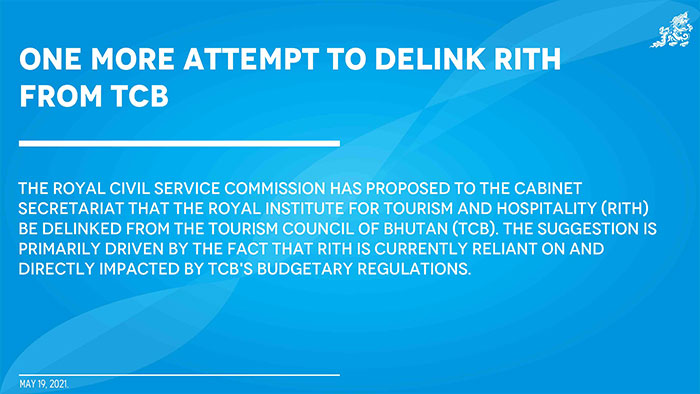Delinking would let RITH grow as an institution, says officials
Yangchen C Rinzin
The Royal Civil Service Commission wants to delink the Royal Institute for Tourism and Hospitality (RITH) from the Tourism Council of Bhutan (TCB). A proposal for the same had been submitted to the Cabinet Secretariat recently.
Cabinet Secretary, Sangay Duba said that the Cabinet is yet to discuss the proposal.
Details on whether it is a complete delink to make the institution an autonomous body or autonomy only over financial and human resources (HR) is not clear. What the RSCS proposed was not shared.
RCSC Commissioner Tshering Yangden said that once the Cabinet approves “what was proposed”, it will direct the council on delinking.
Prime Minister Dr Lotay Tshering during the midterm review last month asked the RCSC to resubmit a detailed proposal after studying all the pros and cons in delinking RITH. The Commissioner informed that there was a need to restudy the proposal to delink RITHS.
Tshering Yangden said that although the TCB’s organisational development exercise (OD) report revealed that there was a need to delink RITH from TCB, it was subjected to further discussion after the Commission realised that they overlooked the interests of private institutes that provided same training in hospitality.
“Private institutes provided short term training while RITH provided diploma courses, but it was important to see if both are provided by the RITH, it could kill private institutes,” she said. “The delinking proposal was not clear, which is why the team had to sit together and rework.”
The idea of delinking RITH from TCB is not new.
OD exercises in 2016 and 2019 suggested delinking RITH from TCB. The first meeting of the third tourism council in 2019 also directed the TCB Secretariat to come up with a final proposal to delink RITH from TCB.
RITH, located in Motithang in Thimphu offers students diploma in Hotel Management and Tourism Management.
If RITH becomes autonomous, the institution would have financial flexibility and HR to get the best of faculty, especially lecturers from relevant tourism industry. This is not possible today when under the TCB.
Officiating Principal, Ugyen Dorji, said delinking RITH is important so that the institution could work with related tourism industry, which he said was not possible when linked with TCB, a government authority.
“All the faculty are civil servants under the RCSC loop and this has deterred training programmes,” he said. “Without financial autonomy, procurement is a problem when governed by government procurement rules, which contradicts our needs.”
One reason for proposing the delinking was that RITH relies on TCB for its budget. Budgetary regulations affected the institution as its budgetary requirement was high.
Ugyen Dorji said that if the institution is given HR and financial autonomy, they could function as a complete autonomous institution. “But if it’s not what we had proposed, it would not bring any changes to the institution,” he added.
For instance, Zhiwaling Ascent, a star rated hotel today was supposed to be run by RITH as a training institution. However, given various issues especially over its autonomy, the plan failed. It is run as a hotel today.
If delinked, RITH plans to work on accreditation with universities abroad that will benefit graduates to find jobs or study abroad apart from bringing foreign students.


